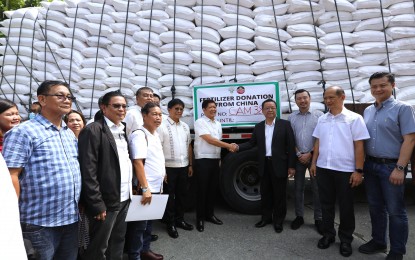[6.16] Marcos, 요소비료 기부에 대한 중국의 관대한 행동에 찬사
컨텐츠 정보
- 20,394 조회
본문
MANILA – "Ferdinand R. Marcos Jr." 회장 금요일 필리핀은 중국이 필리핀에 20,000미터톤의 요소비료를 "관대하게" 기부한 것에 대해 감사를 표하며 이번 조치가 양국 관계 개선의 증거라고 말했습니다.
Valenzuela City의 Malanday에 있는 NFA(National Food Authority) 창고에서 열린 회전식에서 "Marcos"는 중국에서 기증된 요소 비료를 검사했습니다.
'마르코스'는 중국 정부를 대표하는 주필리핀 중국 대사 황시롄(黃西藏)으로부터 비료 기증 증서를 전달받기도 했다.
대통령은 기조연설에서 "필리핀 국민을 대신해 이번 기부에 대해 중국 정부와 국민에게 깊은 감사를 표한다"고 말했다.
“비료 공급 측면에서 우리가 지원을 요청하자 중국이 우리가 처한 곤경을 즉시 이해했다는 사실이 놀랍지 않습니다. 따라서 오늘날 우리는 중국에서 필리핀으로 20,000미터톤의 요소비료를 판매하고 있습니다."라고 Marcos는 덧붙였습니다.
Marcos는 기부금이 식량 안보를 추구하여 농업 생산을 늘리려는 그의 행정부의 시도를 실현하는 데 도움이 될 것이라고 말했습니다.
우연한 인터뷰에서 Marcos는 기증된 비료가 농무부(DA)의 기존 바우처 시스템을 통해 Luzon의 농부들에게 배포될 것이라고 말했습니다.
“우리는 루손을 우선시할 것입니다. 이미 가지고 있는 바우처 시스템을 통해 루손에서 배포할 예정입니다. 이것들은 우리가 지역 농부들에게 줄 비료 공급에 포함될 것입니다.”라고 그는 말했습니다.
그는 “농민들의 근면과 근면은 식량 자급자족이라는 실현 가능한 목표이자 양국 간의 오랜 우호 관계의 지속적이고 유익한 영향”이라고 덧붙였다.
2019년 4월 25일 필리핀과 중국 정부 간의 경제 및 기술 협력에 관한 협정에서 제공한 보조금의 일부는 인민폐(RMB) 1억(PHP782.68백만) 상당의 요소비료 기부입니다.
요소는 비료 및 동물 사료 첨가제로 농업 부문에서 널리 사용됩니다. 약 46%의 높은 질소 함량을 가진 요소 비료는 식물 성장을 시작하고 식물을 무성하게 보이게 합니다.
중성이며 거의 모든 유형의 토양과 작물에 적응할 수 있는 백색 결정질 유기 화합물입니다.
'유망한' 농업 협력
Marcos는 필리핀과 중국 간의 농업 협력이 "매우, 매우 유망한" 것으로 밝혀졌다고 말했습니다.
그는 식량 생산을 개선하고 농부들의 곤경을 완화하려는 두 국가의 이니셔티브에서 유사점을 인정했기 때문입니다.
“그래서 우리는 아주 많은 방법으로 서로에게서 배울 수 있고, 그것은 지금까지 오랫동안 진행된 과정이었습니다. 지금 뿐만 아니라 전 세계적으로 식량 위기를 느끼고 있기 때문에 농업에 있어서도 비슷한 우선순위를 갖고 있기 때문에 저는 매우 낙관적입니다."라고 Marcos는 말했습니다.
유대 강화
중국이 요소 비료를 기부한 후 Marcos는 중국 정부와 마닐라의 관계를 더욱 강화할 것을 약속한다고 중국 정부를 안심시켰습니다.
“이러한 관대 한 행동은 양국 관계의 가치를 상징합니다. 우리는 계속 양육해야 하며, 상호 지원과 지속적이고 우호적인 대화를 통해 이를 계속 돌봐야 합니다.”라고 말했습니다.
“필리핀은 항상 우리 관계를 강화하고 상호 이익을 증진하기 위해 노력할 것이며, 그 수가 많다는 것을 중국 정부에 확신합니다. 양국 수교의 다음 반세기를 향해 걸어가는 이 날이 우리에게 많은 일을 기념하는 날이 되기를 바랍니다.”라고 Marcos는 덧붙였습니다.
행정장관은 중국의 최근 움직임을 "우정과 선의의 굳건한 몸짓"으로 인정하면서 서약을 했습니다.
'세계적 수준의' 농업
Marcos는 또한 DA 포트폴리오를 계속 맡으면서 필리핀 농업을 개선하겠다는 서약을 반복했습니다.
그는 농업 산업의 글로벌 경쟁력을 높이고 "세계적 수준"으로 만드는 데 열중하고 있다고 말했습니다.
“우리는 글로벌 경제이며 글로벌 경제에서 경쟁해야 합니다. 그래서 우리 농업은 세계적 수준이라고 말할 수 있고 전 세계, 특히 우리 지역의 모든 농업 생산자들과 경쟁할 수 있는 수준에 도달한 것입니다.”라고 Marcos는 말했습니다. (PNA)
This is the Original Article from PNA NEWS
[6.16] Marcos lauds China’s ‘generous act’ to donate urea fertilizers
MANILA – President "Ferdinand R. Marcos Jr." on Friday expressed gratitude to China for its “generous” donation of some 20,000 metric tons of urea fertilizers to the Philippines, saying the act is a testament to the two nations’ improving ties.
During the turnover ceremony at the National Food Authority (NFA) warehouse in Malanday, Valenzuela City, "Marcos" inspected the donated urea fertilizers from China.
"Marcos" also received the certificate of handover on fertilizer donation from Chinese Ambassador to the Philippines Huang Xilian who represented the Chinese government.
“In behalf of the Filipino people, let me extend our deepest gratitude and appreciation to the Chinese government and its people for this donation — a solid gesture of friendship and goodwill,” the President said in a keynote speech.
“I am not surprised that immediately, upon our request for any assistance in terms of fertilizer supply, China immediately understood the predicament that we're in. Thus, we have today the turnover of 20,000 metric tons of urea fertilizer from China to the Philippines,” Marcos added.
Marcos said the donation would help realize his administration’s bid to boost agricultural production in pursuit of food security.
In a chance interview, Marcos said the donated fertilizers will be distributed to farmers in Luzon through the Department of Agriculture’s (DA) existing voucher system.
“We will prioritize Luzon. We will distribute these in Luzon through the voucher system that we already have. these will be included in the supply of fertilizers [that we will give to local farmers,” he said.
“The diligence and hard work of our farmers are the realizable goal of food self-sufficiency and the lasting beneficial impact of the long-standing friendly ties between our two nations,” he added.
The donated urea fertilizers worth renminbi (RMB)100 million (PHP782.68 million) are part of the grant provided in the Agreement on Economic and Technical Cooperation between the Philippine and Chinese governments on April 25, 2019.
Urea is widely used in the agriculture sector both as a fertilizer and animal feed additive. With its high nitrogen content of about 46 percent, urea fertilizer initiates vegetative growth and makes the plants look lush.
It is a white crystalline organic chemical compound that is neutral and can adapt to almost all types of soil and crops.
‘Promising’ agri cooperation
Marcos said the agricultural cooperation between the Philippines and China turns out to be “very, very promising.”
This, as he acknowledged the similarities in the two nations’ initiatives to improve their food production and ease their farmers’ plight.
“So, we can learn from one another in many, many ways, and that has been an ongoing process for long time now. Not just now, because of the food crisis that we are feeling around the world but also we have a very similar priorities when it comes to agriculture, so I am very optimistic,” Marcos said.
Strengthening ties
Following China’s donation of urea fertilizers, Marcos reassured the Chinese government that he is committed to further elevating Manila’s ties with Beijing.
“These generous acts symbolize the value of the relationship between our two countries. We must continue to nurture, we must continue to care for that through acts of mutual assistance and constant and amicable dialogue,” he said.
“I assure the Chinese government that the Philippines will always work for the strengthening of our ties and the advancement of our mutual interests and they are many. As we walk to the next half-century of our diplomatic ties, let this day be a celebration of many things for us,” Marcos added.
The Chief Executive made the vow, as he recognized China’s latest move as a “solid gesture of friendship and goodwill.”
‘World-class’ agriculture
Marcos also reiterated his vow to improve Philippine agriculture as he continues to take on the DA portfolio.
He said he is keen on boosting the agriculture industry’s global competitiveness, as well as on making it “world-class.”
“We are a global economy, and we have to compete in the global economy. And that is why our agriculture has to be brought to a level where we can say it is world class and can compete with all the agricultural producers around the world, especially in our region,” Marcos said. (PNA)
관련자료
-
이전
-
다음


